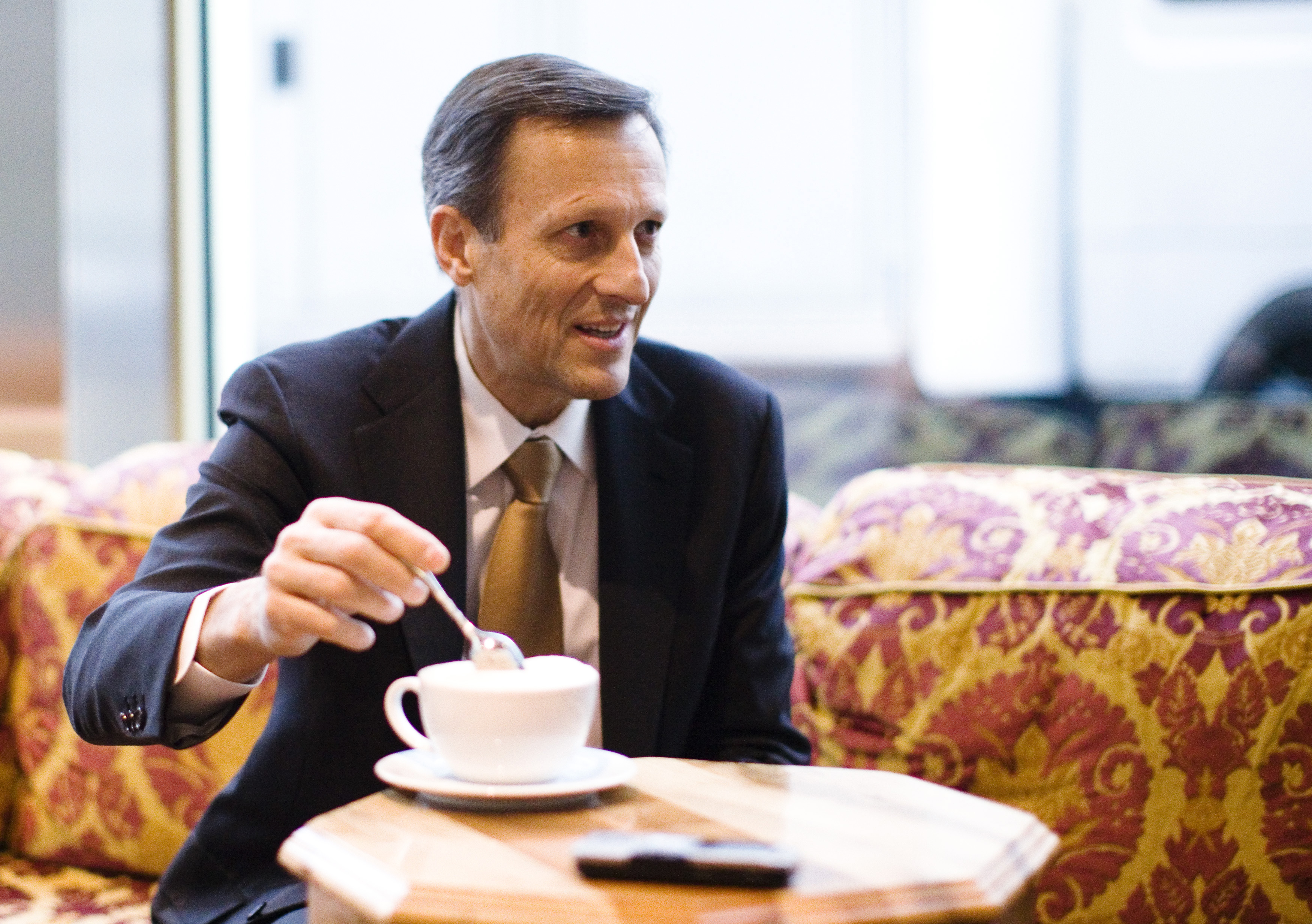
Daniel Vasella – superhero or fat cat?

Swiss newspapers can’t make up their minds about the controversial chairman of pharmaceutical giant Novartis, who announced on Wednesday he would not stand for re-election in February. They’re not even sure why he’s going.
“Is Vasella fleeing from Minder?” was the headline on the front page of tabloid Blick, relegating a victorious Roger Federer (who earns considerably more than Vasella) to a side column. “Is he afraid of the fat-cat initiative being accepted?”
Thomas Minder is a businessman-turned-politician who in 2008 launched an initiative against excessive salaries. Given the climate of popular anger against the hubris of high-flying executives, the initiative received plenty of support and voters will have their say on March 3.
Blick calculated that 59-year-old Vasella, who has held top positions at Novartis since 1996, had pocketed up to SFr300 million ($322 million) over the past 11 years – including SFr44 million in 2006.
“Yesterday Vasella made it clear several times that he’s against the fat cat initiative – but what he actually did yesterday has helped its supporters,” it concluded.
It’s hard to imagine the head of British drugmaker GlaxoSmithKlein making the front page of The Sun, but this shows the central role the pharma industry has in Switzerland and the public attention Vasella has managed to attract.
Indeed, the Neue Zürcher Zeitung (NZZ) described Vasella as a “brilliant CEO – and figure of scorn par excellence”.
“Daniel Vasella has left his mark not only on Novartis but also Switzerland as an industrial location. Nevertheless, for the country he was simply too big,” the paper said.

More
Vasella to step down as Novartis chairman
Stubbornness
Vasella oversaw the 1996 merger of Sandoz and Ciba-Geigy that led to the creation of Novartis. Elected chairman in 1999, he held down the position along with his role as CEO for over a decade, a situation that was criticised by corporate governance specialists.
“Stubbornness is certainly not a bad quality in a businessman – in Vasella’s case it played a not insignificant role in building up a global company,” the NZZ admitted.
“But in the salary debate, Vasella’s stubbornness led to collateral damage that threatens not only Novartis. If the populist Minder initiative is accepted, the entire Swiss economy will be affected for the worse.”
It concluded therefore that “Vasella risks being remembered not as an extraordinary businessman, but as the person who, through sheer stubbornness, lost his sense of moderation and as a result damaged Switzerland more than he benefited it.”
“More burden than asset”
Vasella was also subject of the front page cartoon in Zurich’s Tages-Anzeiger: some laboratory rats pleaded with Vasella to take them with him – “You love mice!”, they said. The word for mouse in German is also slang for money…
“Superhero or fat cat?” was the headline in the paper’s noncommittal main article. “Daniel Vasella had two whirlwind careers: first as a doctor, then as a manager. He almost eradicated leprosy and turned Novartis into a global company. Switzerland repaid him with a vote on manager salaries.”
The paper’s editorialist was more critical of the “exceptional” manager who had, however, missed the right moment to leave, pointing to the five per cent rise in the company’s share price after the news.
“From investors’ point of view, that means towards the end Vasella was more of a burden than an asset. If the situation was otherwise, Novartis’s shares would have collapsed yesterday.”
Geneva’s Le Temps also took an on-the-one-hand-on-the-other view. “As much as he has been detested for his money-grabbing, his desire to concentrate power or his purist free-market ideology, he has been admired for his strategic vision, a readiness to listen and an unmatched persuasiveness no matter who he talked to.”
Intriguing questions
Looking ahead, the Financial Times noted Vasella hadn’t yet left the building “but the chatter about the new Novartis is already under way”.
His departure does, however, raise two “intriguing” questions, according to the paper’s Lex column. “Does a post-Vasella Novartis need to change? And, if it does, how should it change?”
The answer to the first, Lex reckoned, was easy: yes, pointing out that from certain angles Novartis “looks more like a conglomerate than a pharma company”.
As for the second question, Lex pointed out that Novartis was financially strong, but the “Vasella-era buying spree has to be bedded in, and a 33 per cent stake in Roche … remains a question mark”.

In compliance with the JTI standards
More: SWI swissinfo.ch certified by the Journalism Trust Initiative





























You can find an overview of ongoing debates with our journalists here . Please join us!
If you want to start a conversation about a topic raised in this article or want to report factual errors, email us at english@swissinfo.ch.